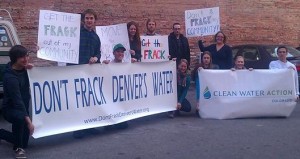
The referenced media source is missing and needs to be re-embedded.
By Erin Adair, Colorado Program Coordinator
On Wednesday, Nov 14th in Denver, the Colorado Oil and Gas Conservation Commission held a hearing for its rulemaking process around ground water monitoring at drill sites and the distance drill sites are allowed to be from homes and schools – or “setbacks”. The hearing was jam-packed, and brought industry, state employees, environmental groups, and the concerns of the public to the table. This is why Clean Water Action showed up.
Clean Water Action’s program and canvass staff demonstrated outside the public meeting holding signs saying “Move the FRACK Back” and “Don’t FRACK my Community” in protest of the State’s lack of leadership on drill site setbacks. Clean Water Action supports a 2,000 feet setback in Colorado, which would make it nearly impossible for drilling and fracking to occur within the city limits of most communities on the Front Range. Colorado’s current “setbacks” in urban or densely populated areas is 350 feet, which is NOT protective of human health or quality of life. Scientific studies indicate that cancer causing air emissions may cause health impacts to people up to a half mile from a drill site. Additionally, impacts to water, noise and light pollution due to 24/7 drilling and fracking, and impacts to home values are a very serious concern.
Fracking has recently become a hot issue and is on the tip of everyone’s tongue here in Colorado. The City of Longmont in northern Colorado voted to ban fracking within its city limits by nearly a 2-1 margin through a ballot initiative – this was an unprecedented victory and the first of its kind in Colorado. Now the State is scrambling to make a decision on next steps and the oil and gas industry is feeling a little sour about the $600,000 they spent to defeat the ballot initiative. Only 8 days after the election – some folks are still a little on edge.
When we tried to enter the building with our signs, we were immediately stopped by building staff and told we were not permitted to attend this “public meeting” because it was being held in a privately owned building. The Colorado Oil and Gas Conservation Commission then gave us permission to attend their public meeting, but we were not able to bring in our signs. A reporter from the Associated Press tweeted in reaction to our dramatic entrance and covered the issue in the Denver Post.Related Posts
Stay Informed
Get the latest updates and actions:
Thanks for signing up!
There was a problem processing your signup. Please try again.


